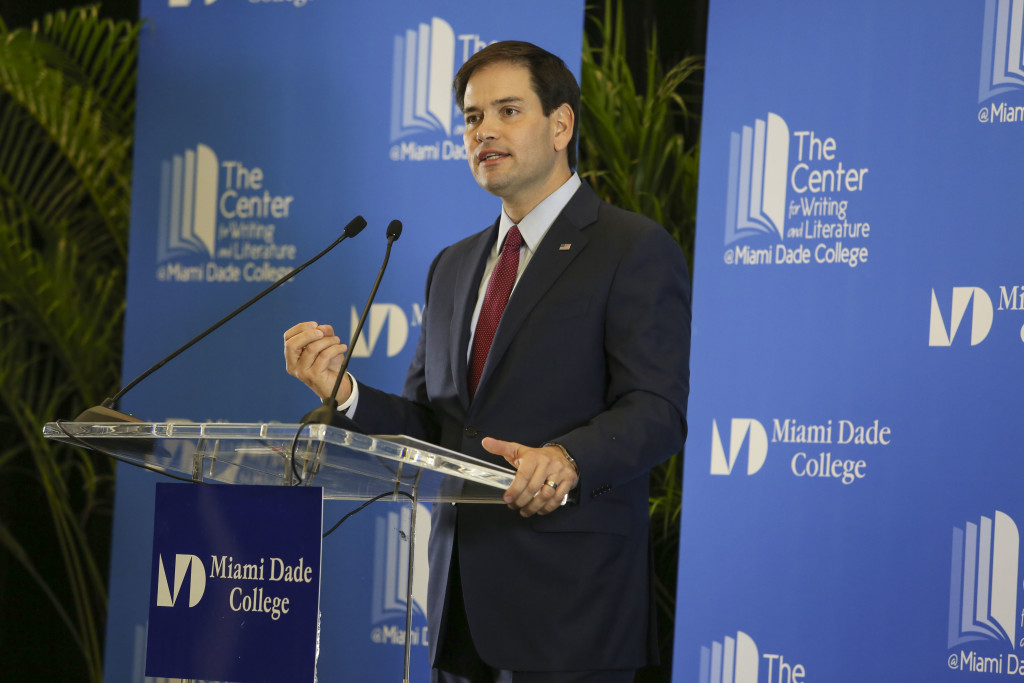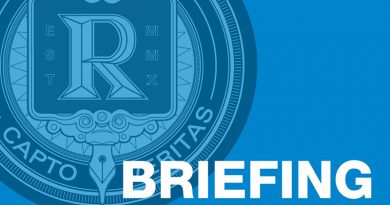Rubio Heckled During Book Talk At Wolfson Campus
Republican Senator, Marco Rubio, was heckled by a handful of young students, who disagree with his stance on immigration policies, during an event at Wolfson Campus on Feb. 20 to promote his latest book, American Dreams.
Rubio opposed the expansion of Deferred Action for Childhood Arrivals or DACA for parents and supported the decisions of the judge who put a temporary stay on the executive order to expand the current DACA program.
Two minutes into the talk that was attended by nearly 1,000 people, Rubio was interrupted by Jorge Tume, a 23-year-old Miami Dade College student.
“Am I deportable?” Tume shouted at Rubio from his seat in the audience.
Tume and eight other activists take issue with Rubio’s stance on immigration reform. To make their point they shouted: “What about my parents?” and “My parents played by the rules!”
The audience applauded in the hopes of becoming louder than the protesters. Some demanded that the activists be silenced and be removed from the auditorium. As the protesters continued, MDC’s security personnel rushed in to escort the activists out.
Rubio apologized for the incident and told the crowd that he was one of the few politicians that gets heckled by both sides of the immigration debate.
“It’s pretty amazing,” he joked. “I just hope they bought the book.”
Continuing past the interruption, Rubio delivered his message and introduced the proposals he outlines in his book. Some believe the book is Rubio’s political manifesto and that he could be the presidential candidate for the Republican party in 2016.
“I honestly believe that if we confront the challenges and embrace the opportunities of this era, the 21st century will also be an American century,” Rubio said at the presentation as the crowd applauded. “I honestly believe that not only will we save the American Dream but we will allow it to reach more people than ever before.”
Activists shouted out interruptions throughout his presentation. Rubio is a child of Cuban immigrants. American Dreams does not focus on immigration. His main points hone in on the current higher educational system, and he offers several options. For example, the Student Right to Know Before You Go Act, a bill that will fund a website which contains information about career paths’ potential economic earnings, graduation rates for particular majors and the average student debt for each of them.
He also proposes an alternative to the student loans programs that are already in use. He suggests a student investment plan where private investment firms will be able to invest—at their own risk— in a student’s college education. The students in return will have to pay back a predefined percentage of their future income for a set period of time, also predefined. Firms will base their investments on students’ career choices, academic records and projected salary after graduation.
Rubio also proposes to reform the current set-rate payment system to an income-based payment system where, by default, students will pay for their loan based on their income. According to Rubio, students are not fully aware of the many options and when they try other forms of payment that are flexible with their current incomes, they find themselves in a bureaucratic labyrinth.
Throughout his book, Rubio presents his ideas on the remediation on several aspects of the economy, health care, social security and tax-code reforms. He extensively argues the need for policies that are new and innovative in order to solve the problems of this era.
“If we want to restore the American Dream, we need tax policies, regulatory policies and spending policies that make America the best place in the world to invest, and the easiest place in the world to create businesses and new jobs through innovation,” Rubio writes.
After the presentation, the protesters stayed outside building 3. As the crowd left the building, many of Rubio supporters shouted criticism at the protesters during an emotional exchange.




